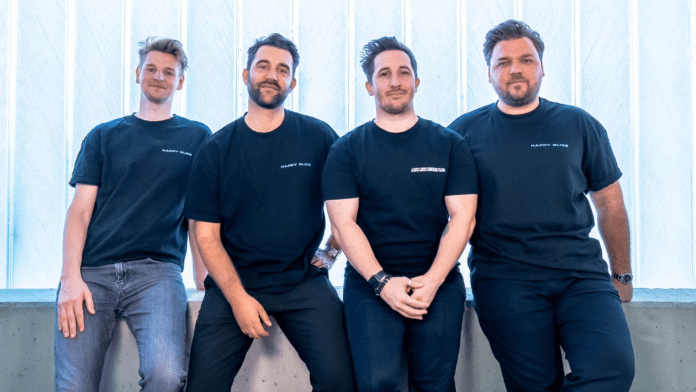Two major catalysts for the expansion of social and e-commerce platforms have been the realms of food and influencers. Consequently, it’s hardly astonishing that startups are actively seeking ways to integrate these two elements. In the most recent development, a Berlin-based startup known as Lanch, which collaborates with influencers and content creators to establish impromptu food delivery brands, has secured a substantial $6.9 million (€6.5 million) in funding.
The startup’s food brands, which are endorsed by influencers, are prepared in “virtual kitchens.” These virtual kitchens are not ghost kitchens but free spaces within established restaurants and other retail kitchens. Lanch mentioned that their initial venture, “Happy Slice,” a pizza brand developed in collaboration with German YouTubers Knossi and Trymacs, successfully sold over 30,000 pizzas during its debut weekend, making investors take notice of this delightful success story. The company is now preparing for its second brand, “Loco Chicken,” in partnership with German musician Luciano.
Felix Capital and HV Capital are leading the Series A funding round, with several individuals also joining the investment. The specific valuation remains undisclosed.
The idea might come off as a bit gimmicky. Associating a well-known individual, who isn’t primarily known for food, with a food brand doesn’t seem like a guaranteed formula for success.
To make matters worse, in the U.S., where other startups are experimenting with comparable concepts, the execution seems to have left a negative impression on some individuals.
Virtual Dining Concepts, having secured approximately $20 million in funding (according to PitchBook data), has collaborated with several prominent figures since its establishment in 2018. Among these, MrBeast is entangled in a legal dispute with VDC. This lawsuit was initiated following complaints from MrBeast’s fans, who found “MrBeast Burgers” to be “unappetizing” and “inedible.” VDC, in turn, is pursuing a counterclaim of $100 million.
There are certainly notable parallels between Lanch and VDC. Both companies rely on influencer partnerships to establish food delivery brands. These brands are then linked with “virtual kitchens”—not precisely ghost kitchens, but available kitchen space often connected to existing restaurants or food services. These spaces are utilized to prepare the food items using ingredients supplied by Lanch.
Additionally, both companies delegate the distribution aspect: their brands are made available through food delivery platforms (in Europe, think of Delivery Hero, Just Eat, or Deliveroo) for delivery to customers.
However, Nono Konopka, a Co-Founder of Lanch alongside Dominic Kluge, Jonas Meynert, and Kevin Kock, is confident that Lanch adopts a more technology-centric approach compared to its U.S. counterparts. This approach is anticipated to add the crucial element, similar to umami, to its business model—specifically in the form of data.
“We focused on tech really early on,” he said in an interview, “building quality-control software that measures both qualitative and quantitative data.”
He explained that the goal is to provide creators with greater insights, enabling them to better engage with their audiences while gaining a deeper understanding of their preferences and desires. For these content creators, data serves as a valuable resource for nurturing their audience, fine-tuning their future actions, and expanding their opportunities for sponsorships and other revenue-generating ventures.
Lanch also shares data with the restaurants it collaborates with. For restaurants, optimizing foot traffic and efficiently utilizing staff and resources to minimize waste are paramount. Lanch’s value proposition lies in aiding these establishments to optimize kitchen usage, gain prompt customer insights on demand trends, receive alerts for any negative feedback, and improve overall efficiency.
The aspiration is that all of these measures will prevent any controversies similar to those associated with MrBeast.
Lanch initiated with 70 restaurants for Happy Slice and plans to increase to 100 for Loco Chicken. Their goal for the upcoming year is to encompass over 500 locations in total. Beyond that, they aspire to expand beyond delivery to include physical dining options and diversify into other food-related products and experiences.
Restaurants receive one-third of the earnings, while the remaining two-thirds are divided among influencers, delivery platforms, and Lanch itself. The company reports that its inaugural brand, active for approximately four months, has already facilitated roughly seven payouts.
“The ‘power of brands’ is a core belief that we have had since the beginning of Felix,” said Frederic Court, the founder of Felix Capital. “Over time, we have built increasing conviction on the superpowers that creators have in today’s digitized world, and are impressed with Lanch’s distinct and innovative positioning, built on community.”
The company is currently in the process of launching its services in Austria and has intentions to expand into the U.K., Spain, the Netherlands, and France. In these markets, it aims to collaborate with three or four content creators, a more manageable number, according to Konopka.





